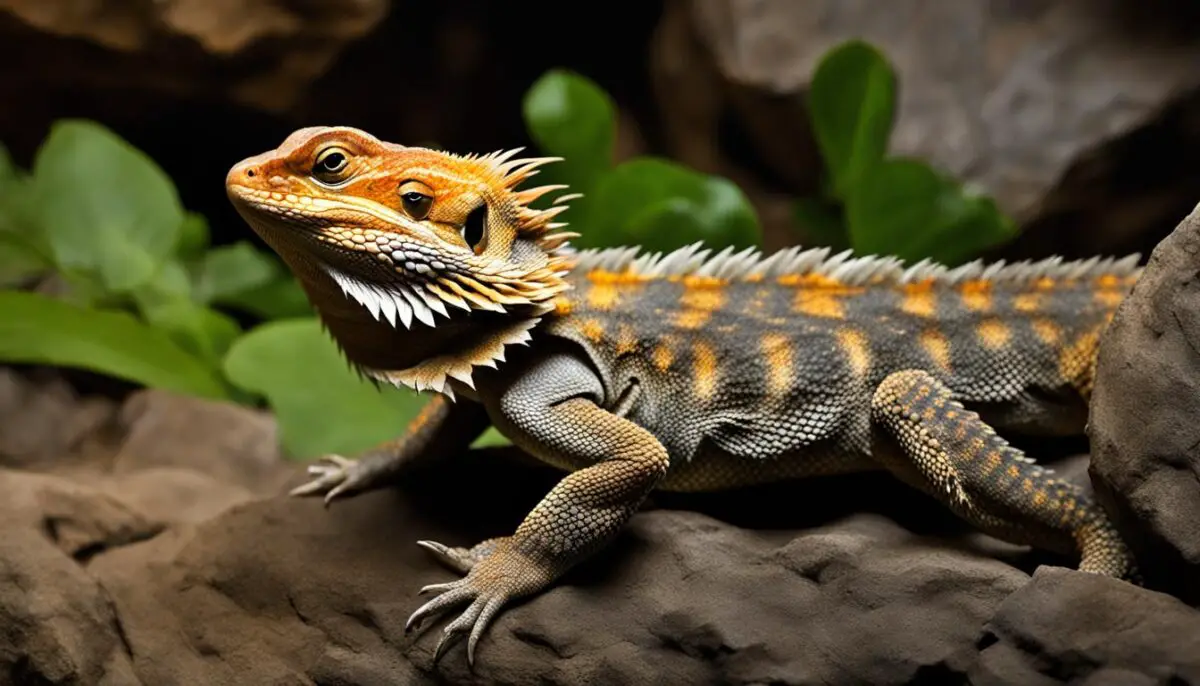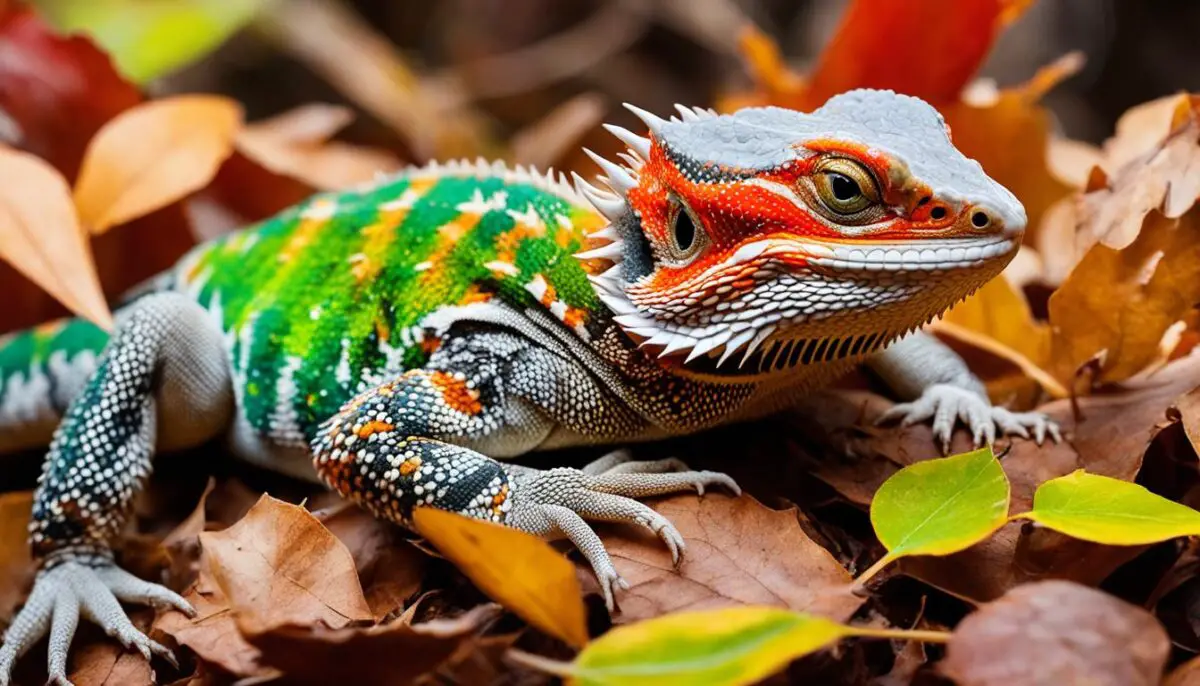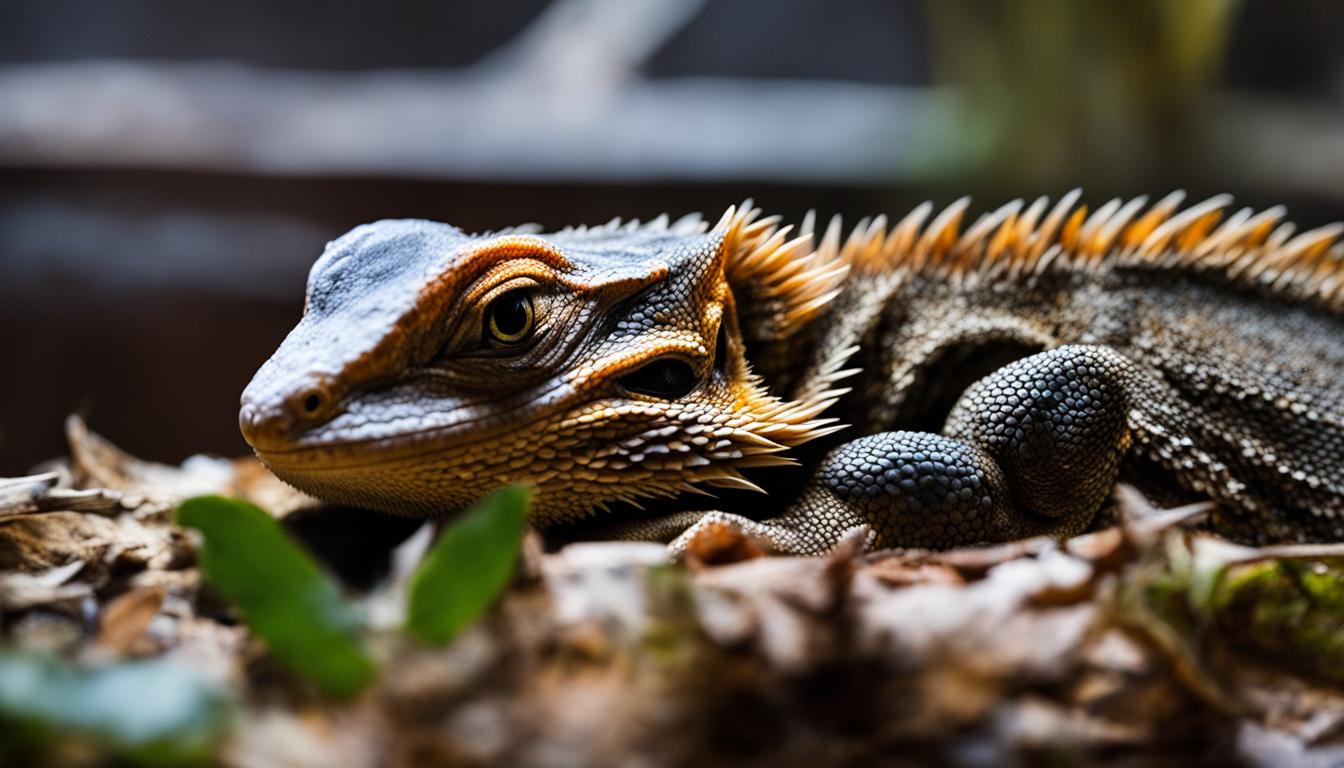Brumation is a natural phenomenon observed in Bearded dragons and other reptiles during the winter months. It is a period of dormancy similar to hibernation, where the dragon’s activity levels decrease, and their body processes slow down. During brumation, Bearded dragons may display various signs that indicate their transition into this state.
- Decreased appetite
- Reduced time spent in the basking area
- Retreating to cooler areas of the enclosure
- Sleeping for longer periods of time
- Seeking dark places to hide or dig for a nesting spot
The dragon’s body temperature, heart rate, and respiration rate also decrease during brumation, contributing to their overall inactivity and lethargy. It is important to note that not all Bearded dragons will brumate, and if a dragon is losing weight dramatically, is lethargic, or is less than 10 months old, it is advisable to seek veterinary advice.
Key Takeaways:
- Brumation is a hibernation-like state that some Bearded dragons go through during the winter.
- Signs of brumation in Bearded dragons include decreased appetite, reduced activity, and seeking cooler areas.
- Brumation is a natural process, but not all Bearded dragons will brumate.
- If a dragon shows signs of brumation, it is important to provide appropriate care and monitor their health.
- Consulting with a vet is recommended if there are concerns about a dragon’s health during brumation.
What is Brumation?
Brumation is a natural process observed in many reptiles during the winter months. It is a hibernation-like state where the reptile’s body processes slow down, heart rate decreases, and they appear to be in a deep sleep. Bearded dragons, being cold-blooded animals, are no exception to this phenomenon.
Unlike warm-blooded animals that generate their own body heat, bearded dragons rely on their environment to regulate their body temperature. In the wild, when the desert winters turn cold, they instinctively burrow in the ground or trees to conserve energy and survive the harsh conditions.
While in brumation, reptiles such as bearded dragons will often wake up briefly to drink water before returning to their dormant state. It is important to note that while domesticated bearded dragons are more prone to brumate, not all of them will go through this process.

During brumation, bearded dragons appear lethargic and spend most of their time resting. Their metabolic activities slow down, allowing them to conserve energy and endure the winter without the need for excessive feeding or activity.
While brumation may resemble hibernation, it is different in that reptiles in brumation will occasionally wake up to drink water, unlike hibernating warm-blooded animals that remain completely dormant throughout their winter sleep.
Understanding brumation in bearded dragons is crucial for their owners to provide appropriate care during this period and differentiate it from potential health issues. The next section will discuss the signs and behaviors exhibited by bearded dragons during brumation.
Bearded Dragon Brumation Signs
During brumation, Bearded dragons exhibit specific signs that indicate their transition into a state of hibernation-like sleep. It’s essential for owners to be aware of these signs to provide appropriate care and support for their dragons. Some common signs of brumation in Bearded dragons include:
- Increased sleep: Bearded dragons will spend more time sleeping and appear less active during brumation.
- Earlier bedtime: They may seek their hideouts earlier in the evening or spend extended periods in dark areas of their enclosure.
- Loss of appetite or complete refusal of food: Bearded dragons may show a decreased interest in eating or refuse food altogether.
- Frequent hiding or burrowing: They exhibit a preference for hiding or burrowing behavior, seeking shelter in subterranean areas within their habitat.
- Less frequent bowel movements: Bearded dragons may have reduced bowel movements due to decreased food intake.
- Disinterest in interactions with humans: During brumation, Bearded dragons may exhibit less interest in human interactions or handling.
- Aversion to being handled: They may display reluctance or discomfort when being handled.
These signs typically manifest in the late fall, preceding the winter months. However, it’s important to note that these behaviors could also indicate other health issues or the presence of parasites. Consulting with a veterinarian is highly recommended to confirm whether your Bearded dragon is indeed undergoing brumation.
Here is an image of a Bearded dragon exhibiting the hiding behavior often observed during brumation:

Understanding the frequency and duration of brumation in Bearded dragons is important for their care and overall well-being. By closely monitoring their behavior and consulting with a vet when needed, you can ensure that your dragon goes through a healthy brumation period.
Brumation Frequency and Duration in Bearded Dragons
| Frequency | Duration |
|---|---|
| Once a year | Varies from a few weeks to several months |
| Every other year | Varies from a few weeks to several months |
| Once in their lifetime | Varies from a few weeks to several months |
Table: Brumation frequency and duration in Bearded dragons.
Should You Prevent or End Bearded Dragon Brumation?
Generally, it is best to allow Bearded dragons to go through brumation as it is a natural process. However, there are certain circumstances where veterinary advice may be required to prevent brumation.
Preventing Bearded Dragon Brumation:
Situations where it may be necessary to prevent brumation include when the dragon is under a year old. Brumation involves a prolonged period of going without food, which can be harmful to a growing body. To ensure the dragon’s health and development, consulting with a vet for guidance on preventive measures is recommended in such cases.
Health Concerns during Brumation:
If a Bearded dragon starts to brumate during a warm season or shows signs of illness, it is advisable to consult with a vet to prevent or address any underlying health concerns. During brumation, the dragon’s body processes slow down significantly, and underlying health issues may become more pronounced. Monitoring the dragon’s behavior closely and seeking veterinary advice if any abnormal symptoms arise is crucial for the dragon’s well-being.
Overall, it is important to closely monitor your Bearded dragon’s behavior during brumation and consult with a vet if you have any concerns. By being vigilant and proactive, you can help ensure your dragon’s health and well-being throughout the brumation process.
Conclusion
Brumation is a natural behavior observed in Bearded dragons and many other reptiles during the winter months. It is a survival tactic that allows these reptiles to conserve energy and withstand colder temperatures and food scarcity. While not all Bearded dragons will brumate, it is important to understand the signs of brumation and provide appropriate care during this period to ensure their well-being.
During brumation, it is essential to adjust the temperature and lighting conditions in their enclosure to mimic the cooler winter environment. Monitor their weight loss and offer water regularly to keep them hydrated. Additionally, consulting with a veterinarian is strongly recommended to address any concerns and ensure the dragon’s health during this winter rest cycle.
Understanding and supporting your Bearded dragon’s brumation behavior is crucial for their overall health and well-being. By providing the necessary care and seeking professional advice when needed, you can help your dragon safely navigate through this natural reptile winter rest cycle and ensure they emerge healthy and active when spring arrives.
FAQ
What are the signs of brumation in Bearded dragons?
Signs of brumation in Bearded dragons include decreased appetite, reduced time spent in the basking area, retreating to cooler areas of the enclosure, sleeping for longer periods of time, and seeking dark places to hide or dig for a nesting spot.
What is brumation?
Brumation is a hibernation-like state that some ectothermic animals, such as Bearded dragons, go through during the winter. It is a period of decreased activity, lower heart rate, body temperature, and respiration rate.
How do Bearded dragons behave during brumation?
During brumation, Bearded dragons may exhibit signs such as increased sleep, earlier bedtime, loss of appetite or refusal of food, frequent hiding or burrowing, less frequent bowel movements, disinterest in interactions with humans, and an aversion to being handled.
What should I do if my Bearded dragon shows signs of brumation?
If your Bearded dragon shows signs of brumation, it is important to prepare their habitat accordingly, optimize heating and lighting conditions, ensure they have a bowel movement before entering brumation, and consult with a vet to confirm if it is indeed brumation.
When and how long do Bearded dragons brumate?
The timing and duration of brumation can vary among Bearded dragons. Some may brumate every year, while others may brumate every other year or only once in their lifetime. The duration can range from a few weeks to several months.
Should I prevent or end Bearded dragon brumation?
Generally, it is best to allow Bearded dragons to go through brumation as it is a natural process. However, there are certain circumstances where veterinary advice may be required, such as if the dragon is under a year old or shows signs of illness.
What is the purpose of brumation in Bearded dragons?
Brumation is a survival tactic to conserve energy and withstand colder temperatures and food scarcity during the winter months. It is a natural behavior observed in Bearded dragons and many other reptiles.

